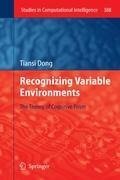
-
 Anglický jazyk
Anglický jazyk
Recognizing Variable Environments
Autor: Tiansi Dong
Normal adults do not have any difficulty in recognizing their homes. But can artificial systems do in the same way as humans? This book collects interdisciplinary evidences and presents an answer from the perspective of computing, namely, the theory of cognitive... Viac o knihe
Na objednávku, dodanie 2-4 týždne
98.99 €
bežná cena: 109.99 €
O knihe
Normal adults do not have any difficulty in recognizing their homes. But can artificial systems do in the same way as humans? This book collects interdisciplinary evidences and presents an answer from the perspective of computing, namely, the theory of cognitive prism. To recognize an environment, an intelligent system only needs to classify objects, structures them based on the connection relation (not through measuring!), subjectively orders the objects, and compares with the target environment, whose knowledge is similarly structured. The intelligent system works, therefore, like a prism: when a beam of light (a scene) reaches (is perceived) to an optical prism (by an intelligent system), some light (objects) is reflected (are neglected), those passed through (the recognized objects) are distorted (are ordered differently). So comes the term 'cognitive prism'! Two fundamental propositions used in the theory can be informally stated as follow: an orientation relation is a kind of distance comparison relation -- you being in front of me means you being nearer to my face than to my other sides; a pair of objects being connected means any object, precisely the space occupied by the object, can be moved to a place where it connects with the pair.
- Vydavateľstvo: Springer Berlin Heidelberg
- Rok vydania: 2011
- Formát: Hardback
- Rozmer: 241 x 160 mm
- Jazyk: Anglický jazyk
- ISBN: 9783642240577











 Nemecký jazyk
Nemecký jazyk 